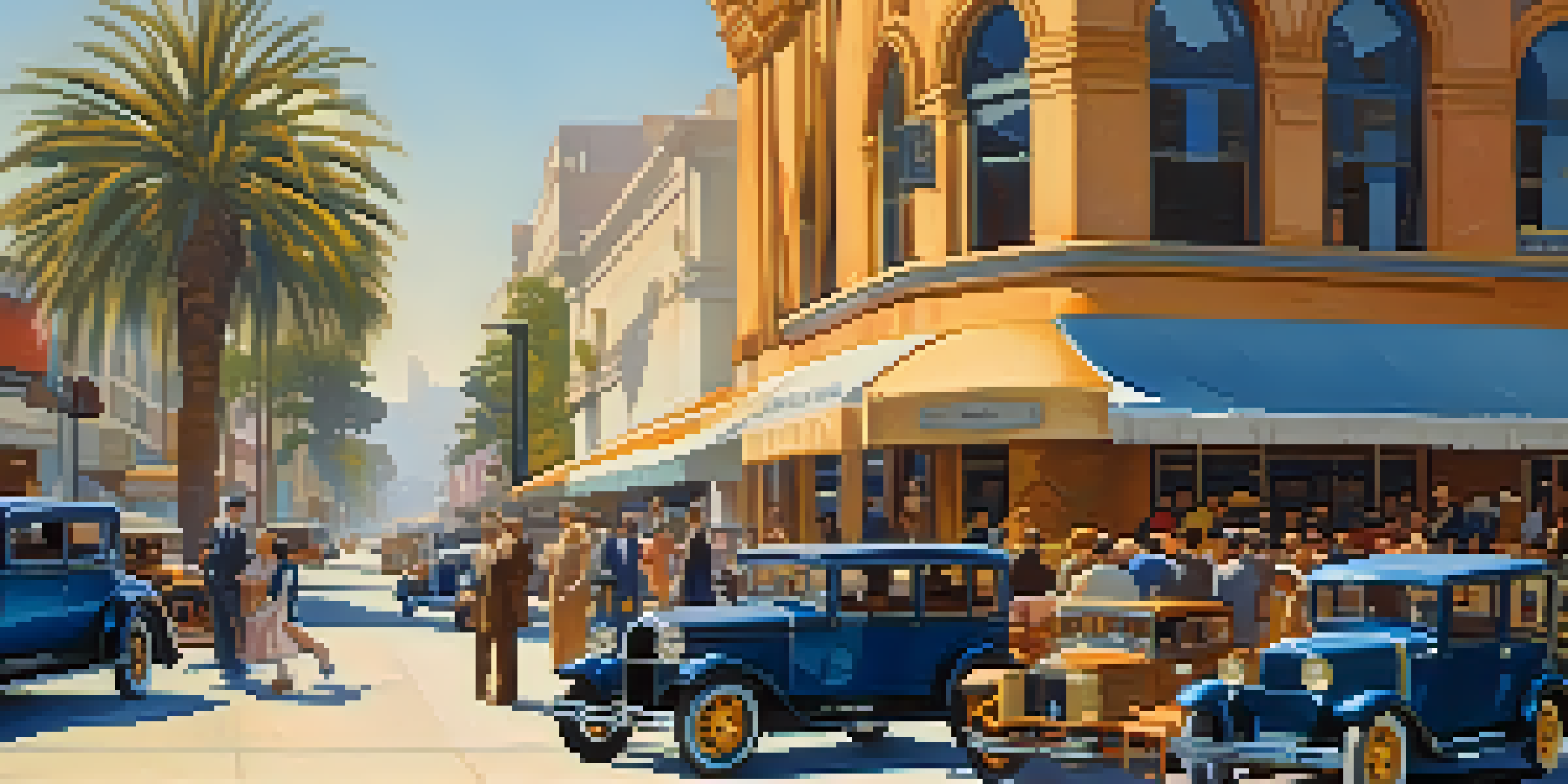The Evolution of Los Angeles Literature Through the Decades

The Roaring Twenties: Birth of a Literary Scene
The 1920s marked a vibrant era for Los Angeles, where literature began to flourish. Writers like Nathanael West and F. Scott Fitzgerald captured the glitz and glamour of the city, reflecting its burgeoning fame. The artistic atmosphere was fueled by the Hollywood dream, weaving narratives that blended reality with fantasy. This decade laid the groundwork for a unique voice that would continue to evolve in the years to come.
The 1930s: Grappling with the Great Depression
As the Great Depression struck, Los Angeles literature took a darker turn. Authors like John Fante began to explore themes of struggle, identity, and resilience against a backdrop of economic turmoil. These narratives highlighted the harsh realities of life while still maintaining a sense of hope. This decade showcased a shift towards more introspective and socially conscious writing.
Literary Evolution in LA's Decades
Los Angeles literature has evolved significantly from the glitz of the 1920s to the diverse voices of the 21st century.
The 1940s: War, Film Noir, and New Voices
The 1940s brought the chaos of World War II and the rise of film noir, heavily influencing literature in Los Angeles. Writers like Raymond Chandler and James M. Cain delved into the dark underbelly of the city, crafting gripping stories filled with mystery and moral ambiguity. This era also introduced new voices from diverse backgrounds, enriching the literary landscape. The fusion of crime fiction and cinematic elements captured the complexities of post-war life.
The 1950s: Beat Generation and Counterculture
The 1950s saw the emergence of the Beat Generation, with writers like Jack Kerouac and Allen Ginsberg challenging societal norms. Los Angeles became a hub for artistic rebellion, where spontaneity and freedom of expression reigned. Their works often reflected the search for identity and belonging, resonating with the disillusioned youth of the time. This decade marked a significant departure from previous literary conventions.
Social Change Shapes Literary Themes
Each decade's social and political climate profoundly influenced the themes and styles of writers in Los Angeles.
The 1960s: Social Change and Political Literature
The 1960s were characterized by social upheaval and a call for change, which deeply affected literature in Los Angeles. Authors like Joan Didion captured the essence of the counterculture movement, blending personal narrative with political commentary. Their works explored issues of race, gender, and social justice, pushing boundaries and challenging the status quo. This decade solidified literature as a powerful medium for activism and reflection.
The 1970s: The Rise of Chicano Literature
The 1970s heralded the rise of Chicano literature, as voices from the Latino community gained prominence. Writers like Rudolfo Anaya and Sandra Cisneros began to share stories that celebrated their cultural heritage while addressing issues of identity and belonging. This literary movement contributed to a broader understanding of Los Angeles as a diverse city. It emphasized the importance of representation and authenticity in storytelling.
Diversity and Digital Age Impact
The 21st century has seen a remarkable increase in diverse narratives, further amplified by digital platforms.
The 1980s and 1990s: Postmodernism and Globalization
With the advent of postmodernism in the 1980s, Los Angeles literature embraced fragmentation and experimentation. Authors like Thomas Pynchon used complex narratives to reflect the chaotic spirit of the era. The influence of globalization also introduced new themes, expanding the city's literary voice to include a wider array of perspectives. This period marked a transition into a more interconnected and multifaceted literary world.
The 21st Century: Diversity and Digital Transformation
In the 21st century, Los Angeles literature has embraced diversity more than ever, with voices from various backgrounds and cultures taking center stage. Writers like Viet Thanh Nguyen and Chimamanda Ngozi Adichie explore global issues while grounding their narratives in the local context. The digital age has also transformed how literature is consumed and shared, with social media platforms amplifying new voices. This ongoing evolution reflects the dynamic and ever-changing landscape of Los Angeles.